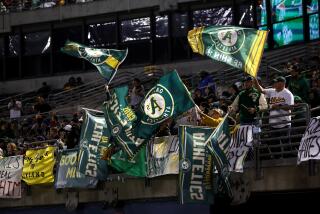Umpires’ Unanimity Dwindling
- Share via
Support among major league umpires for the attempt to force management to the bargaining table by submitting their resignations, effective Sept. 2, may have begun to disintegrate Monday. A baseball official said that between 10% and 20% of those who submitted resignations notified their league offices that they want to rescind the resignation or are considering it.
“In light of the reaction, I think these guys feel they made a big mistake predicated on faulty legal advice,” the official said.
An American League umpire said he thought those percentages were high and that to his knowledge five AL umpires called the league office Monday to request rescinding of their resignations. He added, however, that the Monday movement might have represented only the first wave of defections.
“There’s a lot of turmoil, and it’s going to get worse before it gets better,” he said. “I think [union counsel Richie Phillips] is going to have a tough time holding it together.
“I think a lot of the guys have looked at and thought about what sounded like a good idea last Wednesday and now question it. Nobody really wants to walk away from their jobs.”
Said Pat Campbell, the union’s associate counsel: “I can’t confirm [whether any umpires] did or didn’t call their leagues. People were not calling us to say they’re withdrawing. I don’t believe that there’s a major split. I talked to several umpires today and everything seems fine.”
Phillips had said last week that 57 of the 68 umpires had submitted their resignation. Two of the remaining 11--John Shulock and Derryl Cousins--are not members of the union. Phillips said he expected the other nine to join the process, but sources said Monday that more than nine umpires have either asked their leagues to rescind their resignations or do not plan to submit a resignation. Among those umpires are Rocky Roe, Dale Scott, Jim Joyce, Tim Welke, Davey Phillips, John Hirschbeck, Tim McClelland, Terry Craft, Durwood Merrill and Jim McKean. Scott and Welke are members of the union’s board of directors.
All of those umpires are employed by the American League, where there is believed to be less overall support for Phillips’ often confrontational style and less militancy than among National League umpires regarding 1) a plan to centralize the umpires under Sandy Alderson, baseball’s executive vice president, and 2) the need to establish a trust and bargaining relationship with Alderson.
National League umpire Bruce Froemming, reached in Cincinnati on Monday, said it is the general feeling that Commissioner Bud Selig has given Alderson “carte blanche to get us in line” and there has been no communication from Selig since a code of conduct meeting two years ago--a significant lapse in the communication established by commissioners Peter Ueberroth, Bart Giamatti and Fay Vincent.
“It’s unfair,” Froemming said. “He’s basically put it in Sandy’s lap and said ‘go get ‘em.’ Hopefully, cooler heads will prevail and we can work out an agreement.”
Selig is expected to issue a statement on the umpires’ resignation strategy by midweek. The current agreement expires Dec. 31. It prevents the umpires from striking, but they would qualify for $15.4 million in severance if they resign. Their hope, of course, is that the threat will lead to serious bargaining talks. The risk, however, is that management, will simply permit them to walk and try to build a staff of replacements.
The complication is that minor league umpires have now organized, hired Phillips as their counsel, and, although not recognized as a union by the National Assn. of Professional Baseball Leagues, which governs the minors, plan to stage a wildcat strike Friday, according to a source familiar with the situation.
More to Read
Go beyond the scoreboard
Get the latest on L.A.'s teams in the daily Sports Report newsletter.
You may occasionally receive promotional content from the Los Angeles Times.









